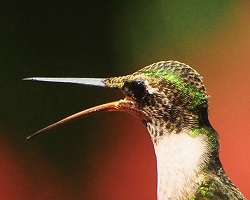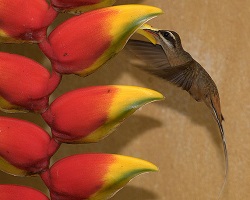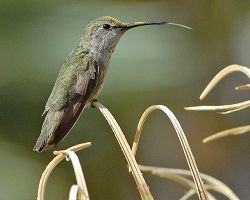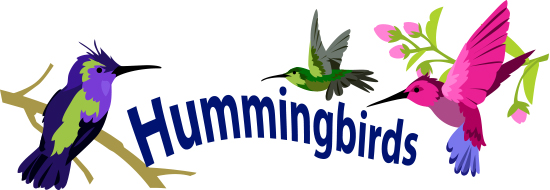Flower Birds?

Hummingbirds are famous for drinking nectar out of flowers. They're nature's sugar addicts. But they don't live on nectar alone. Hummingbirds eat insects to add proteins and minerals to their diets. They may pick these insects off leaves and trees (a process called "gleaning"). They're also skilled enough fliers to catch fruit flies and other small bugs in midair (which is called "hawking.")
A Big Appetite
Humans may be told that snacking between meals is going to ruin their dinner, but hummingbirds eat like there's no tomorrow—if they don't, they might not live through the day. A hummingbird needs a lot of food.

A hummingbird eats about half of its body weight in sugar daily and may have a meal up to every ten minutes. In eight hours, that bird could have up to forty-eight small meals! A single hummingbird may also consume hundreds of fruit flies a day.
Finding Food
The hummingbird's brain is tiny, no bigger than a pea, but it's quite large for the size of its body. This brain lets it remember exactly where it found a meal yesterday and find that patch of flowers or hummingbird feeder again using visual landmarks. Their good eyesight also helps them notice flowers and tiny insects that humans often overlook.
A hummingbird may defend a particularly good patch of flowers from other hummingbirds, but if too many birds come to fight them for it, they'll move on to seek meals elsewhere.

A Special Tongue
At one point, scientists believed that hummingbirds drank nectar by sucking it up like juice through a straw. But we now know that although the shape of the beak helps the bird reach deep into a flower, its long, thin tongue does the real work. A hummingbird licks nectar up, like a dog lapping at a bowl of water. Not very much nectar actually makes it into the bird's mouth in one lick, but this isn't a problem. A hummingbird can lick up to thirteen times per second.
Additional images via Wikimedia Commons. White-necked jacobin by Joseph C. Boone.
Read more about: Hummingbirds
Bibliographic details:
- Article: Hummingbird Foraging
- Author(s): Dr. Biology
- Publisher: Arizona State University School of Life Sciences Ask A Biologist
- Site name: ASU - Ask A Biologist
- Date published:
- Date accessed:
- Link: https://askabiologist.asu.edu/hummingbird-foraging
APA Style
Dr. Biology. (). Hummingbird Foraging. ASU - Ask A Biologist. Retrieved from https://askabiologist.asu.edu/hummingbird-foraging
Chicago Manual of Style
Dr. Biology. "Hummingbird Foraging". ASU - Ask A Biologist. . https://askabiologist.asu.edu/hummingbird-foraging
Dr. Biology. "Hummingbird Foraging". ASU - Ask A Biologist. . ASU - Ask A Biologist, Web. https://askabiologist.asu.edu/hummingbird-foraging
MLA 2017 Style

Bright males like this white-necked jacobin may have a better chance to defend a territory where they can find food.
Be Part of
Ask A Biologist
By volunteering, or simply sending us feedback on the site. Scientists, teachers, writers, illustrators, and translators are all important to the program. If you are interested in helping with the website we have a Volunteers page to get the process started.

